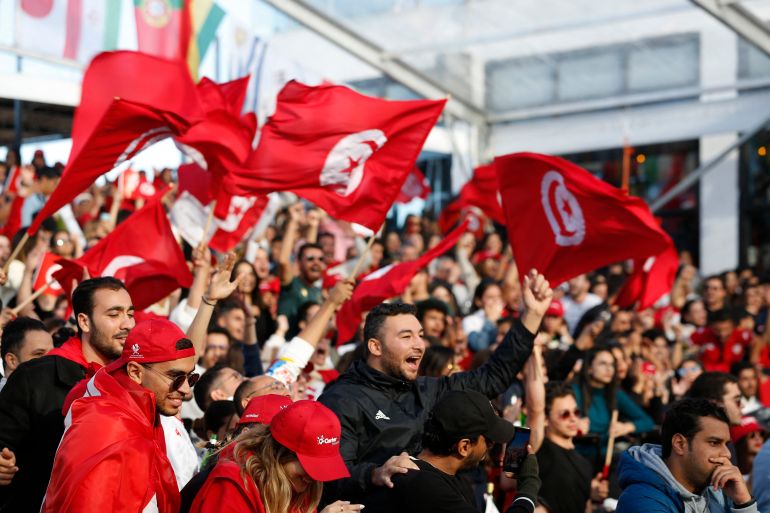Struggling Tunisians find joy in spirited World Cup display
With their economy in a crisis, Tunisians have little to smile about these days – but their football team is one of them.

Tunis, Tunisia – Businesses closed so early on Tuesday in Tunis, it might as well have been a public holiday.
The reason was none other than the opening match of the Eagles of Carthage, as Tunisia’s football team are known, in the Qatar World Cup campaign against Denmark.
Keep reading
list of 4 itemsCristiano Ronaldo scores winner in record 200th game for Portugal
Kylian Mbappe informs PSG he will not extend contract: Media
Qatar World Cup: Watchdog says FIFA’s carbon-neutral claims false
An hour before the 2pm (13:00 GMT) kickoff, Tunisians were stunned – like the rest of the world – to see Saudi Arabia celebrate one of the biggest upsets in the tournament’s history by beating Lionel Messi’s Argentina 2-1.
The shock win raised hopes among Tunisians that their team, ranked 30th in the world, could also land a surprise blow to their opponents, who occupy the 10th place in FIFA’s rankings.
“It’s the biggest surprise of the World Cup so far,” Amine, a student who like many others in the capital headed out to watch Tunisia play, said of Saudi Arabia’s victory.
Half an hour before kickoff, the streets were busy but vehicle traffic was fast-moving. Taxi Jamaiya, the yellow minibuses that ferry mostly working-class people around, were racing as the clock ticked on. On the radio, football pundits spoke in an urgent tone about formation and strategy.
![An Arabic tea house in Tunis filled with customers watching the Tunisia vs Denmark World Cup match [Elizia Volkmann/Al Jazeera]](/wp-content/uploads/2022/11/image_50738945.jpg?w=770&resize=770%2C578)
Cafés and bars quickly filled with patrons. Most places were standing-room only. The walls of many premises echoed to the sound of football chanting against the insistent drumming on the traditional tambours.
With their economy in a tailspin amid a cost of living crisis, shortages of basic goods and soaring unemployment, Tunisians do not have much to cheer about these days – but the sight of the team stepping onto the Education City Stadium was enough to send waves of excitement roaring through the busy commercial La Fayette district.
As the game began, a nervous silence took over, interrupted by gasps of delighted surprise every time Tunisia threatened to score a goal.
Half-time found both teams goalless, and inside a Chabbi “salon de thé” (working class tea house), the air was thick with cigarette and shisha smoke. and the sound system belts out popular songs that have become synonymous with the matches of the national team.
Despite the food shortages that have blighted the country this year, the owners did their best to keep things going: Sugar was available for customers to take with coffee, while the milk for their cappuccinos came from a can.
Deep into the second half, and it was still nil all. Denmark scored, but the anguish was short-lived as the goal was disallowed as an offside violation. Then, it was eyes glued to the screen again and deep concentration as fans prayed for Tunisia to make it beyond the groups’ stage for the first time in their sixth appearance at a World Cup.
An emotional rollercoaster, the high-octane match saw Tunisia play very well – but Denmark was dangerous, too.
In the 67th minute, a visibly tired Anis Slimane was substituted by Naim Sliti. Fans cheered on.
“He’s an attacking player, so that’s why everyone’s happy!” said Mohammed, who is in town for a business start-up training course.
“Tunisia are playing really well and against a really strong team,” he added.
There were more cheers in the 80th minute as offensive midfielder Hannibal Mejbri also came.
“He’s a game changer,” said the optimistic Mohammed.
Still, nothing changed and the final whistle found both teams level. But for the Tunisian fans, and the Tunisian players celebrating in Doha, it felt like a victory.
Now, their focus was on the third group match on November 29 against reigning champions and former colonial power France. Or, as Mohammed laughed, “the old oppressor”.
